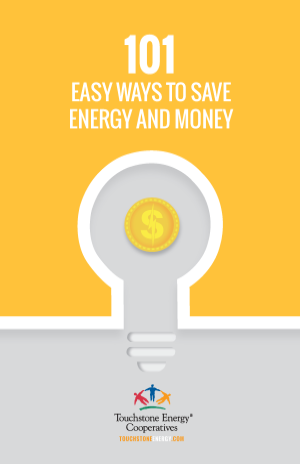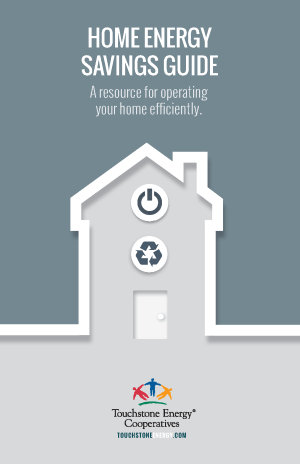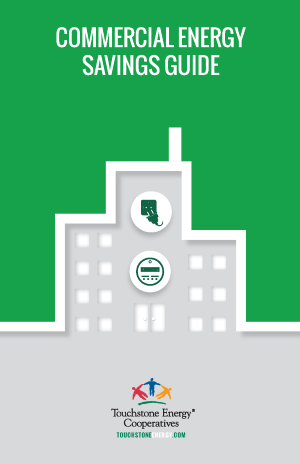Energy Efficiency
CVEC uses Advanced Metering Infrastructure (AMI) - aka smart meters. Smart meters record energy near real-time, and report regularly, short intervals throughout the day. This information is available in your SmartHub account and can be used to get an accurate picture of your energy usage. Comparing the current month, or month of particular concern, with the same months in the past years will help you see the bigger energy picture.
There are many factors that play a role in your home’s energy usage. Use the websites listed below to identify the best ways to save energy and discover resources to make those savings happen.
Another factor to consider when looking at higher electric bills, is the weather. Up to 50% of a home’s energy bill is attributable to heating and cooling. Homes that heat with electricity are affected the most by weather. But even fossil fuel heating systems will experience higher electric consumption during colder weather conditions because of longer air handler run times.
Even though there is not much we can do about the weather, being aware of how it affects your energy usage can help save money. SmartHub shows members average daily temperatures and can be used to track the trends of the differing temperatures affecting your energy consumption.
Energy Audit
If you have reviewed the above information and still feel that you may have a deeper problem, please call our office at 325-655-6957. We can discuss your usage and concerns. If we cannot come to a conclusion, an energy audit may be warranted to determine the next steps.
Touchstone Home Energy Adventure
Take the Home Energy Adventure Tour to learn about how you can save energy and money at home.
Home Energy Saver
Discover all the way save around your home!
Our Energy Videos
Watch videos on saving energy, from heating and cooling to lighting and insulation. These short clips provide simple, easy to follow tips.
Another factor to consider when looking at higher electric bills, is the weather. Up to 50% of a home’s energy bill is attributable to heating and cooling. Homes that heat with electricity are affected the most by weather. But even fossil fuel heating systems will experience higher electric consumption during colder weather conditions because of longer air handler run times.
Even though there is not much we can do about the weather, being aware of how it affects your energy usage can help save money. SmartHub shows members average daily temperatures and can be used to track the trends of the differing temperatures affecting your energy consumption.
Check out the seasonal energy-saving tips below.
Cool Off Your Winter Energy Bill
With the winter season, comes budgeting for holiday gifts, meals, maybe a vacation- but with money tight, that doesn't leave much room for energy efficiency upgrades at home. Does that mean you're powerless to lower your electric bill? Not at all. Keep your energy bill cool in the winter with these tips and tricks.
Drape delivery. Are you using your curtains to retain heat? Open drapes and shades to catch free solar heat during the day. Close them at night to keep the heat inside.
Got tape? Through not as durable as foam or vinyl, you can use nonporous tape (first-aid cloth tape, for example) to keep cold air from infiltrating your home. Tape is good for blocking corners and irregular cracks, and can be used at the top and bottom of a window sash, door frames, attic hatches, and inoperable windows.
Pull the plug. Unplug any appliance or electronic device that you don't regularly use. Most devices use electricity anytime they are plugged in even if they are off.
Be a fan of fans. Run ceiling fans on low and reverse the rotation to blow air up in winter. This keeps warm air circulating without cooling you.
Flue flux. Be sure you fireplace damper is tightly closed anytime the fireplace is not being used.
Get caulking. Add caulk or weatherstripping to seal gaps around leaky doors and windows.
Garage drain. Leave your garage door down. A warmer garage in winter will save energy.
Rug relief. Have a spare rug? Use it to cover bare floors for added insulation.
Bundle Up. Slip on some fuzzy socks and a sweater and lower the thermostat. You can save 5% for every degree you drop your thermostat between 60 and 70 degrees.
Smart food. When cooking, keep lids on pots and let hot food cool off before placing it in the refrigerator.
There are other ways to conserve energy, too. Remember, you don't pay for what you don't use. When you're not watching TV or using lights, computers, or other electronics, turn them off.
Take Control of Summer Electric Bills
We tend to think of summer as high-bill season. Fortunately, there are some ways to cut back on your electricity usage to help prevent high electric bills.
- You can save as much as 10 percent a year on your cooling (and heating) bills by simply turning your thermostat back 10 to 15 percent for eight hours a day. In the summer, raise the thermostat when you go to work or whenever you're away from home (from 76 degrees to 85 degrees, for example). That's the single most cost-effective measure you can take. If you install a programmable thermostat, it can do this for you.
- Have a qualified professional check out our air conditioner (and the heating system, too, while they're at it). Preventative maintenance can save you money as well as preclude temperature discomfort.
- Shade your outdoor air conditioning unit to up its energy efficiency.
- Change air conditioner filters monthly. Clogged filters force the unit to work harder and increase operating costs.
- Portable and ceiling fans can make you feel cooler' when you feel cooler, you can set the thermostat higher. But when you leave the room, turn off the fan.
- Installing and using a whole-house fan can help reduce air conditioning costs. These fans draw outside air in through open windows and should be used only when the outside air temperature is lower than the desired inside temperature.
- Seal doors and windows with caulk and weatherstripping. And, if your windows are single-pane, consider replacing them. Double- and triple-pane windows are substantially more energy efficient.
- Shading and evaporative cooling from trees reduce the air temperature around your home. Plant trees, shrubs and vines with leaves that fall off in the winter on the east, south and west sides of your home. They'll provide shade n the summer but allow sunshine in the winter. Position trees to shade windows now. When they mature, they'll also shade the walls and roof.
- It's well worth your investment to wrap any uninsulated ducts with at least 2 inches of fiberglass insulation. Sealing the duct system to prevent leaks is even more important if the ducts are located in an uncooled area, such as the attic. Most leaks will be found where the air duct attaches to the air conditioning unit and where ducts are joined together.
Don't Be Fooled by Common Energy Myths
Eating carrots will greatly improve your eyesight, cracking your knuckles leads to arthritis, and watching too much TV will harm your vision. We've all heard those old wives' tales, but did you know there are also many misconceptions about home energy use?
Many people think that walking into a chilly room and raising the thermostat to 85 degrees will heat the room more quickly. That's not true.
Thermostats direct a home's heating, ventilating and air conditioning system to heat or cool to a certain temperature. Drastically adjusting the thermostat setting will not make a difference in how quickly you feel warmer. The same is true for cooling. The U.S. Department of Energy recommends setting your thermostat to 78 degrees during the summer months and 68 degrees during winter months.
While it can be tempting to check the progress of a dish in the oven, opening the door does waste energy. Every time the oven door is opened, the temperature inside is reduced by as much as 25 degrees, delaying the progress of your dish and, more importantly, costing you additional money. If you need to check the progress of a delicious pie, use the oven light.
Many consumers believe that reducing energy use requires expensive upfront costs, like purchasing new, more efficient appliances or making renovations to an older home. But the truth is consumers who make small changes to their energy efficiency habits, such as turning off lights when not in use, sealing air leaks and using a programmable thermostat, can see a reduction in energy consumption.
On their own, programmable thermostats do not make your HVAC system more efficient. Their money-saving value lies in their ability to - once properly programmed - regulate the temperature inside your house to coincide with your habits. If you need help programming your thermostat, directions are usually available on the manufacturer's website.
Even when turned off, most modern electronics consume electricity so long as they are still plugged in. Chargers for mobile devices such as cellphones also consume electricity when plugged in, even when they are not actively charging a device. This is wasted energy accounts for as much as 10% of a home's total electric use, according to the Lawrence Berkeley National Laboratory. The solution: Unplug your electronics when you've finished using them.
Air that leaks through cracks and gaps throughout your home creates as much of an energy drain as leaving a window open all year long, according to Energy Star. The average homeowner can save up to 10% on their total annual energy spending by sealing and insulating their home.
Even though a higher level of current is needed to turn on a light, this higher level is only used for a fraction of a second. When a light is kept on, it uses a lower level of power but for much longer. Leaving a light on for longer than a few seconds uses more energy than turning it off and back on as needed.
Thanks to standby power settings, most appliances constantly use energy to be ready for immediate usage. These "energy vampires" cannot be turned completely off without unplugging the device altogether.
Forced-air heating systems are designed to operate with all of the registers open. The blower won't perform as well with the registers closed and can create whistling in the ducts. In some cases, duct systems have so many leaks that closing a register won't force more warm air into other rooms - it will force more air out of the leaks.
Hand-washing a load of dishes requires a lot of hot water and therefore a lot of energy. Today, most dishwashers have energy-efficient settings that typically allow you to run a load of dishes using less water and less energy than washing by hand.
While heat can be lost through windows, window heat loss is only a small percentage of the total heat loss in most homes. Typically, walls account for much more heat loss because of their large surface area. It's best to consider insulating walls before upgrading windows.
New windows can increase security and comfort, but they'll take 20-30 years to pay for themselves. Replacing single-pane windows with double-pane low-e windows will save energy and money, but in a house with 20 windows, it'll take you almost 24 years to recoup the cost of the new windows. That being said, if you plan to stay in your home and the existing windows are drafty and in disrepair, it's probably a good idea to replace them.
Your computer continues to draw quite a lot of power in sleep mode so the computer can be ready to pop back on at a moment's notice. It is best to shut your computer down all the way overnight or when you are planning on not using it for awhile.
Remember: Energy efficiency doesn't have to be difficult. Focus on small changes to save big.









